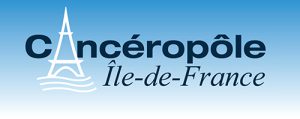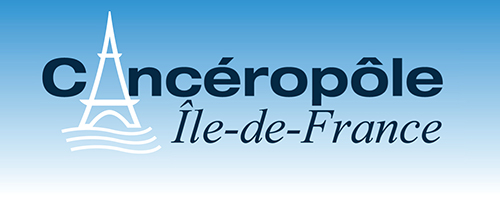Located at the crossroads of European and global trade, the Paris Region is France’s leading economic region, and one of the top in Europe. Comprising 8 départements, 1,295 communes and arrondissements, it is home to a population of 12.2 million (19% of the French metropolitan population), younger than the national average.
IDF REGION INITIATIVES IN RESEARCH AND INNOVATION
Between 2004 and 2016, the Cancéropôle Île-de-France was accredited by the Île-de-France Region as a “Cancerology” Major Area of Interest (DIM). The funding obtained in this context has had a major leverage effect on cancer research in Île-de-France and on the structuring of the Cancéropôle IDF’s Ile-de-France network.
Since 2017, the Île-de-France Region’s actions for cancer research have been deployed in different ways on flagship themes with investment needs:
- Equipment financing through the Sesame program
- Support for researchers through targeted calls for projects: Paris Region PhD, mobility grants
- Support for cross-functional themes such as the Artificial Intelligence Plan 2021 and support for the most vulnerable.
- Support for innovation in the healthcare sector via the Innov’Up call for projects and the Innovators’ Prize.
- Labeling of the ITAC domain in immunology
> Find out more about the Île-de-France Region’s actions in the fight against cancer
Academic players in cancer research in the Paris region
The Paris Region is a key player in our country’s scientific and technological research. In terms of personnel, the region accounts for over 40% of the national potential in both public and private research, i.e. some 135,000 people (all disciplines combined).

Today, 37.2% of public research is located in Île-de-France (CNRS 2018 figures). The region is home to numerous research institutes working in the field of cancer:
- of the 16 universities in the Paris region, 11 are active in the cancer field
- CNRS or Inserm research units, many of them under joint supervision
- 2 Centres de Lutte contre le cancer Gustave Roussy and Institut Curie
- Research institutions Institut Pasteur, CEA, Inria, Institut Polytechnique, ENS
- Care centers hosting research units at AP-HP and private hospital groups (GH Paris St Joseph, Hôpital Foch
Research funding from the French government via INCa, ITMO Cancer Aviesan and ANR has led to the creation of a number of excellence schemes and networks led by teams in the Paris region:
- 50% of Idex, 40% of Labex, 36% of Equipex are in the Paris region
- 5 of the 8 Sirics are in the Paris Region
- The Seqoia platform, implemented as part of the France Médecine Génomique 2025 plan
- 6 IHU and 7 RHU in oncology in the Paris region
- 3 of the 5 bioclusters accredited in 2023, including the Paris Saclay Cancer Cluster (PSCC), the first accredited biocluster dedicated to innovation in oncology
The excellence of Paris Region institutions is also recognized internationally. For example, 3 centers have been designated Comprehensive Cancer Centers by the OECI.
Numerous inter-institutional thematic networks have also been set up at regional level. The Cancéropôle IDF plays a major role in coordinating some of them:
- The network of technology platforms is organized at regional level within the Technologies & Synergies group. A map of technology platforms involved in cancer research in the Paris region has been drawn up by the Cancéropôle IDF, to facilitate collaboration.
- collaboration between Ile-de-France representatives of national networks for rare cancer patients has been set up within the Cancers and Rare Tumors working group of the Cancéropôle IDF. This enables us to set up structural proof-of-concept initiatives in the IDF region, which will be extended to the national level if they are successful.
- Since 2011, Inca and DGOS have been supporting the deployment of OncoGeriatric Coordination Units (UCOGs). Of the 24 UCOGs in France, 5 are in the Paris region. The Elderly Cancer Patients working group is helping to set up federative projects involving these 5 networks.
The Paris region’s research landscape has been enriched in recent years by:
- Prairie Artificial Intelligence Institute, bringing together academics and companies
- the Seqoia platform, implemented as part of the France Médecine Génomique 2025 plan
- CAD Data collector and analyzer
- Paris Cancer Institute Carpem
- International Center for Thoracic Cancers
- Institut du thorax Curie Montsouris
- Center Régional de Coordination des Dépistages des Cancers en Île-de-France (Île-de-France regional cancer screening coordination center)
- Servier Research and Development Institute Paris Saclay
- PariSantéCampus
Cancers are a priority for action in the ARS Ile-de-France regional health project (2018-2022). Among the priorities of the 2023-2028 regional health project, some overlap with the objectives of the Cancéropôle IDF’s working groups: reducing social inequalities in health, patient empowerment, and healthcare pathways. Cancéropôle IDF is a member of the ARS-IDF Copil Cancer.
Industrial companies in the Paris Region
Concentrating over 50% of French R&D, the Ile-de-France region is a major player in economic development through innovation. A large number of public and private players create a highly diversified and complex landscape, supported by joint networks whose aim is to create synergies between private and academic research, and enable more patients to benefit from innovations.
On a regional scale, the Medicen healthcare cluster brings together over 510 players in healthcare innovation, including 430 healthtech startups and SMEs, healthcare manufacturers, leading national research institutes and local healthcare establishments. A partnership between Medicen and the Cancéropôle IDF creates a bridge between academia and industry to implement joint initiatives.
Each academic research institution has a innovation unit whose aim is to develop the economic value of research results. To check whether your research project is suitable for commercialization, please contact one of these units (framework agreements have been drawn up between them).
- AP-HP : HUB Innovation – site web – drc-collaboration.recherche@aphp.fr
- Gustave Roussy : Gustave Roussy Transfert – transfert@gustaveroussy.fr
- Institut Curie : Technology Transfert Office de l’Institut Curie – techtransfer@curie.fr
- Institut Pasteur : Direction des applications de la recherche et des relations industrielles – darri@pasteur.fr
- Université Paris Cité : Equipe Innovation et Prématuration de l’Université Paris Cité – innovation.recherche@u-paris.fr
- Sorbonne Université : Direction de la recherche et de la valorisation – medecine-drv@sorbonne-universite.fr
- PSL : PSL Valorisation – psl.valo@psl.eu
- ESPCI : Direction de la recherche – direction.scientifique@espci.fr
- CNRS : CNRS Innovation
- INSERM : Inserm Transfert – www.inserm-transfert.fr/contacts
- CEA : Cellule Relations Entreprises – Transfert.Technologie@cea.fr
The 3 SATTs (Technology Transfer Acceleration Companies) in the Paris region also finance the technological development of innovations stemming from French public research:
- Erganeo : erganeo.com
- SATT Lutech : sattlutech.com
- SATT Paris Saclay : satt-paris-saclay.fr
- Website of the SATT network : satt.fr
Other structures are helping to consolidate the Paris Region landscape for innovation in the field of cancer:
- The PSCC, built on an academic/industrial partnership, aims to act as a link between the various players involved in financing (institutions, incubators, business angels, corporate investment funds, venture capital firms, etc.) and identified innovators. It will offer the most promising European researchers and developers access to the best expertise, tools and services in the field: mentors, networks, funding, data, samples, technologies, infrastructures and laboratories…
- 28 research structures in the Paris Region have been awarded the “Carnot” label: these institutes are committed to developing high-quality partnership research. They are recognized for their scientific and technological expertise, and their ability to respond professionally to the research and innovation needs of businesses.
- The national C.U.R.I.E network has been federating professionals in the field of public research for 30 years.
- In 2022, 28 incubators have been selected as winners of the IDF Region’s Innov’Up Incubation call for projects, including several in the health, science and technology sectors and/or created by higher education and research organizations.
Patient and family representatives and associations
The inventory of Ile-de-France patient and family associations involved and/or interested in the field of cancer carried out by Cancéropôle IDF in 2013 identified two hundred associations, including 50 interested in cancer research. As well as playing a fundamental role in supporting patients and their families throughout their treatment, these associations use their actions to give greater visibility to the voices of patients and their families, and sometimes fund research in areas where this is particularly necessary.
The landscape of associations is, however, in flux, and there is currently no exhaustive, up-to-date mapping of the landscape of patient and family associations working in the cancer field. However, the following lists can be found:
- 29 patient associations listed in the INCa directory for the Paris region
- 28 associations listed by Unicancer
- Patient and family associations working in the field of rare cancers listed by our Cancers and Rare Tumors working group.
In addition to the initiatives run by patient associations, there are also those run by patient partners, whose expertise is sought by healthcare institutions and research teams, as well as by the pharmaceutical industry and research steering bodies.
Several French universities, including Sorbonne Université’s Université des Patients in the Île-de-France region, offer training courses for patients wishing to transform their experience of illness into expertise, within the framework of partnerships with healthcare or research services.




